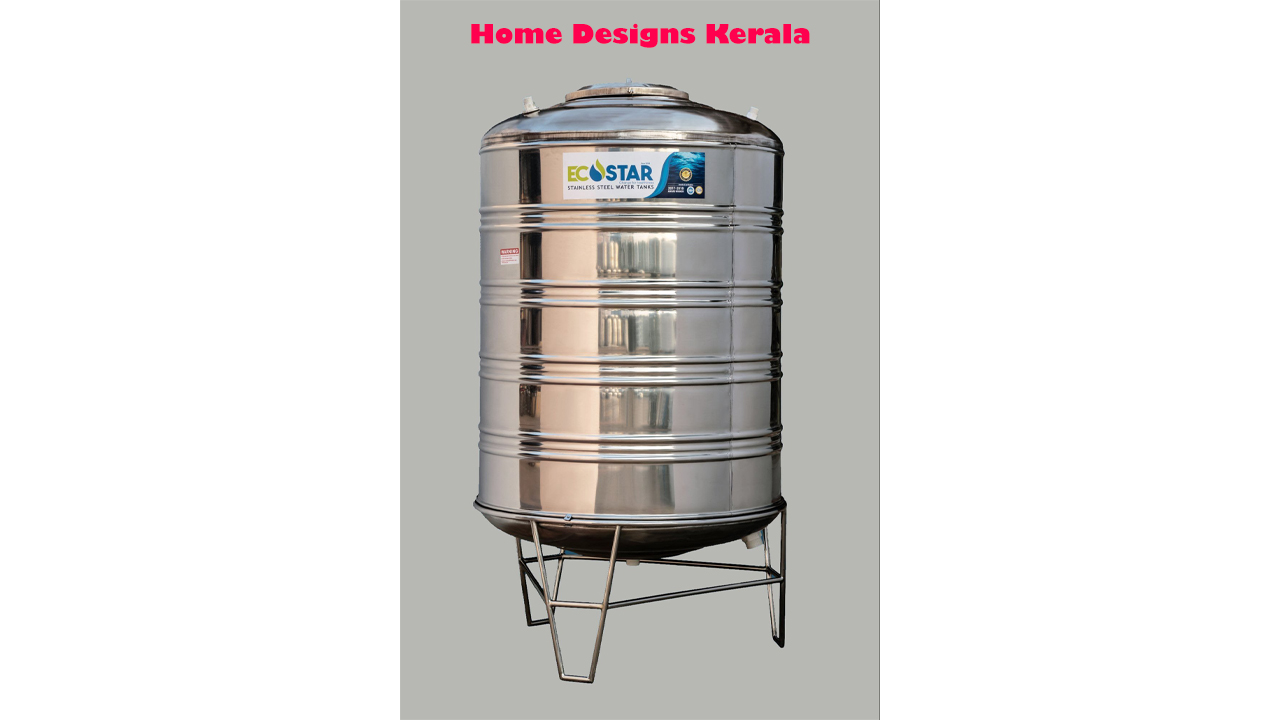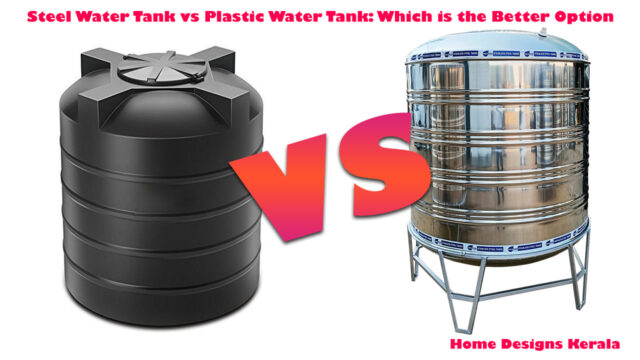Steel Water Tank vs Plastic Water Tank: Which is the Better Option
Both steel and plastic water tanks have their very own advantages and drawbacks, and the choice between them frequently depends on different factors along with price, sturdiness, preservation requirements, and supposed use. Let’s compare them based on one-of-a-kind components:
Cost: Plastic water tanks are generally cheaper than metallic tanks. They are regularly extra cost-effective to manufacture and transport because of their lighter weight and easier production manner.

Durability: Steel tanks are commonly extra long-lasting and may face harsh weather situations, together with severe temperatures and excessive winds, higher than plastic tanks. However, metallic tanks are susceptible to rust and corrosion over time, in particular, if they’re not nicely maintained. Plastic tanks are resistant to rust and corrosion and can close for a long time if properly cared for.
Maintenance: Steel tanks require more renovation than plastic tanks. They want to be inspected frequently for symptoms of rust or corrosion, and any damage ought to be done right away to prevent leaks. Plastic tanks are commonly low renovation and do not require painting or coating to protect against rust.
Installation: Plastic tanks are lighter and less difficult to install in comparison to metallic tanks, which can be heavy and may require specialized gadgets for installation. Plastic tanks can regularly be hooked up using owners without expert help.
Capacity: Both metal and plastic tanks are available in an expansion of sizes and capacities to in shape distinct wishes. However, steel tanks can commonly keep large volumes of water compared to plastic tanks of similar dimensions.
Environmental Impact: Plastic tanks are crafted from non-renewable resources and might contribute to environmental pollutants if no longer well disposed of at the end of their lifespan. Steel tanks are recyclable and might have a decreased environmental impact if recycled nicely.
Aesthetic Appeal: Some humans opt for the appearance of steel tanks, especially in rural or business settings, even as others choose the greater inconspicuous appearance of plastic tanks, which may be buried underground or placed discreetly in the belongings.
Ultimately, the choice between a metallic water tank and a plastic water tank depends on your particular necessities, price range, and choices. It’s crucial to cautiously not forget these factors and verify your desires before you decide.
Here are some extra elements to keep in mind while evaluating metal and plastic water tanks:

Transportation and Installation: Plastic tanks are generally less complicated to move and maneuver into function because of their lighter weight. This may be mainly tremendous in far-off or hard-to-access locations where heavy gadgets might not be easy to have. Steel tanks, then again, may also require specialized delivery and devices for set up, specifically if they may be huge or located in challenging terrain.
Temperature Resistance: Steel tanks can resist severe temperatures higher than plastic tanks. In regions with wide temperature variations, steel tanks may be a more appropriate choice as they’re much less vulnerable to cracking or warping due to temperature adjustments. Plastic tanks may also emerge as brittle in cold temperatures or soften in severe heat, probably compromising their structural integrity.
Water Quality: Both metal and plastic tanks can store potable water, but the fabric composition can affect water pleasant. Plastic tanks are non-corrosive and inert, which means that they won’t impart any flavor, scent, or chemical contaminants to the stored water. Steel tanks may also require defensive linings or coatings to save you from corrosion, which can from time to time affect water if not well maintained.
Customization: Steel tanks provide more flexibility in terms of customization and layout alternatives. They may be fabricated to unique shapes and sizes to suit precise area necessities or architectural considerations. Plastic tanks are normally to be had in widespread dimensions and shapes, although a few manufacturers may additionally provide constrained customization alternatives.
Longevity: While each metallic and plastic tank could have lengthy lifespans while well maintained, metal tanks normally have a longer expected lifespan. With habitual preservation and periodic inspections, a well-constructed metallic tank can last a long time or extra. Plastic tanks may additionally degrade through the years due to publicity to UV radiation, mainly if they are hooked up outdoors and now not UV-stabilized.
Regulatory Compliance: Depending on your vicinity and intended use, there may be regulatory necessities or requirements that dictate the form of material permissible for water garage tanks. It’s critical to test local building codes and rules to ensure compliance with any applicable standards for tank production, cloth, and setup.
Considering those elements along with your precise necessities will help you make a knowledgeable decision between a steel water tank and a plastic water tank on your utility.
Flexibility: Plastic tanks offer some flexibility that metal tanks do not. Plastic tanks may be effortlessly moved or relocated if important, even as steel tanks are generally more everlasting systems as soon as mounted. This flexibility may be wonderful in situations in which the water garage desires may also change over time or if relocation becomes essential.
Maintenance Costs: While plastic tanks normally require much less upkeep than metal tanks, it is also important to not forget the lengthy-term upkeep expenses. Plastic tanks may additionally require periodic cleaning to save you from algae increase or sediment buildup and UV-stabilized plastic tanks may additionally require a much less common alternative due to degradation from daylight publicity.
On the other hand, metal tanks may also incur higher maintenance fees through the years due to the need for rust prevention measures which include coatings or linings.
Security: In a few cases, the security of the water supply can be a concern. Steel tanks may offer better safety in opposition to vandalism or tampering in comparison to plastic tanks, which can be more susceptible to harm from influences or punctures. Additionally, metal tanks can be geared up with locking mechanisms to prevent unauthorized admission.
Fire Resistance: Steel tanks provide higher hearth resistance as compared to plastic tanks. In regions prone to wildfires or where hearth protection is a challenge, steel tanks may be preferred for their capability to face up to excessive temperatures and decrease the chance of hearth spreading to the stored water.
Local Availability and Support: Depending on your area, one sort of tank can be more readily available or supported by local providers and manufacturers. Consider the availability of alternative parts, repair offerings, and technical guides when deciding between metallic and plastic tanks.
Health and Safety Regulations: Depending on the intended use of the water and neighborhood regulations, there can be fitness and safety concerns to recollect. Some programs, inclusive of storing ingesting water for human consumption, might also require compliance with specific standards for materials and construction methods.
Warranty and Guarantees: When evaluating steel and plastic tanks, don’t forget the assurance and ensures supplied by way of the producer. This can offer peace of mind concerning the high quality and durability of the tank, in addition to recourse in case of defects or troubles.
By cautiously weighing those additional elements along the ones previously cited, you could make a well-informed decision on whether a metallic water tank or a plastic water tank is the high-quality choice for your unique wishes and instances.
Transportation and Installation Challenges: Steel tanks, due to their weight and occasionally bulky shape, may also present demanding situations at some point of transportation and set up, mainly in areas with constrained entry to or hard terrain. Plastic tanks, being lighter and frequently extra compact, may be less difficult to transport and install in such conditions.
Impact Resistance: Plastic tanks usually offer better impact resistance in comparison to steel tanks. They are less possibly to dent or deform upon impact, which may be positive in regions prone to hailstorms or falling particles.
Chemical Compatibility: Depending on the intended use, it’s essential to not forget the chemical compatibility of the tank material with the stored liquid. Plastic tanks are to be had in a variety of substances which include polyethylene, polypropylene, and PVC, each with its chemical resistance homes. Steel tanks may also require special coatings or linings to resist corrosion from certain chemical substances.
Installation Footprint: The footprint required for set up may also vary between metal and plastic tanks. Steel tanks may additionally require an extra extensive basis or guide structure, especially for larger capacities, whereas plastic tanks may also have easier set-up necessities.
Recyclability: While each metal and plastic tank can be recycled, the recycling method for every fabric varies. Steel is tremendously recyclable and can be melted down and reused with minimal loss of quality. Plastic recycling may be extra complicated and can bring about a lower-first-class material. Consider the environmental implications and quit-of-lifestyles options for each material.
Also Read this: Know more about AAC (Autoclaved Aerated Concrete) blocks
Noise Considerations: Steel tanks may produce greater noise from water movement or enlargement and contraction because of temperature fluctuations compared to plastic tanks. This can be a consideration if the tank is installed close to residential or sensitive areas in which noise may be a problem.
Corrosion Resistance: While metal tanks can be susceptible to corrosion, specifically in harsh environments or if now not properly maintained, advancements in coatings and corrosion-resistant substances have progressed their sturdiness. Consider the specific situations of the setup website and whether or not additional corrosion safety measures are vital.
Local Climate Considerations: The neighborhood weather, consisting of elements along with temperature extremes, humidity, and UV exposure, can impact the overall performance and durability of each steel and plastic tank. Choose a tank material that is suitable for the triumphing climate conditions in your location to ensure durability and sturdiness.
Considering those extra elements along with your precise requirements and priorities will assist you are making a well-informed decision between a metal water tank and a plastic water tank.
Best steel tanks in Kerala: Tiara, EcoStar, Hykon, Hydropure
Stainless Steel Water Tank Advantages Of SS Water Tank. Watch this YouTube video









